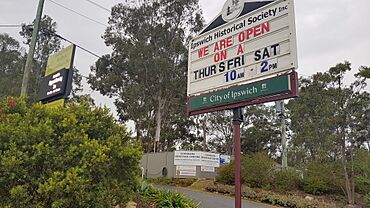New Chum, Queensland facts for kids
Quick facts for kids New ChumIpswich, Queensland |
|||||||||||||||
|---|---|---|---|---|---|---|---|---|---|---|---|---|---|---|---|

Cooneana Heritage Centre, 2023
|
|||||||||||||||
| Population | 0 (2021 census) | ||||||||||||||
| • Density | 0/km2 (0/sq mi) | ||||||||||||||
| Postcode(s) | 4303 | ||||||||||||||
| Area | 6.0 km2 (2.3 sq mi) | ||||||||||||||
| Time zone | AEST (UTC+10:00) | ||||||||||||||
| Location | |||||||||||||||
| LGA(s) | City of Ipswich | ||||||||||||||
| State electorate(s) | Bundamba | ||||||||||||||
| Federal Division(s) | Blair | ||||||||||||||
|
|||||||||||||||
New Chum is a small area, or suburb, located in the City of Ipswich, Queensland, Australia. It's a place with very few people. In fact, the 2021 census showed that New Chum had "no people or a very low population".
Contents
History of New Chum
The name of this suburb comes from an old coal mine called the New Chum mine. This mine was important in the area's past.
Amazing Dinosaur Footprints
New Chum is famous for a really cool discovery: dinosaur footprints! These footprints were found deep underground in 1964.
How the Footprints Were Found
From the late 1800s until the end of the 1900s, there were many underground coal mines in the New Chum area. Miners were working in the Rhondda colliery. About 230 metres (750 feet) below the ground, they found the footprints. They were on the sandstone ceiling of a coal layer called the Striped Bacon coal seam.
What Kind of Dinosaur Made Them?
When the footprints were first found, scientists thought they belonged to a type of meat-eating dinosaur (theropod) called Eubrontes. They even thought the dinosaur might have been the biggest Triassic theropod in the world, with legs over 2 metres (6.5 feet) tall!
Later, scientists took a closer look using 3D technology. They found that the footprints were actually smaller than first thought, about 34 cm (13 inches) long, not 46 cm (18 inches). The shape of the footprints also matched a different kind of trace fossil called Evazoum. A trace fossil is not a bone, but evidence of an animal's activity, like a footprint.
The Evazoum Dinosaur
Scientists now believe that Evazoum footprints were made by prosauropods. These were early relatives of the huge, long-necked sauropod dinosaurs. The dinosaur that made these footprints likely walked on two legs and might have looked a bit like the dinosaur Plateosaurus.
This fossil is very special because it's the only evidence of this group of dinosaurs ever found in Australia. The next time we find evidence of sauropodomorphs in Australia is over 50 million years later, during the Jurassic period.
 | Emma Amos |
 | Edward Mitchell Bannister |
 | Larry D. Alexander |
 | Ernie Barnes |


